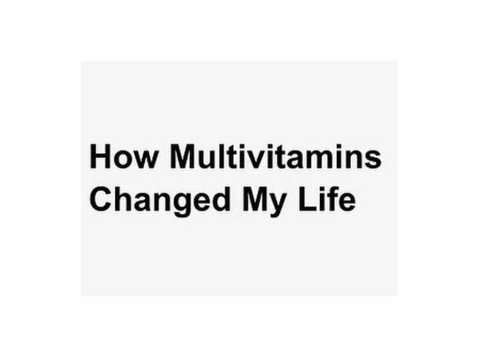Poslané v: Iné v Lucknow | Posted: |
In a world where our days are often jam-packed with various responsibilities, maintaining a well-balanced diet can be a challenge. This is where multivitamins come to the rescue. They are like a safety net, ensuring you get essential nutrients your body needs. But with a plethora of options available, how do you go about choosing the best multivitamin for your unique needs? This comprehensive guide will not only simplify the process but also help you make an informed decision to support your overall health.
Understanding Multivitamins
Before delving into the specifics of choosing the perfect multivitamin, let’s understand what they are and why they are essential. Multivitamins are dietary supplements that contain a combination of vitamins, minerals, and sometimes other beneficial compounds. They are designed to fill nutritional gaps in your diet, ensuring your body receives the necessary nutrients it might not be getting from food alone.
Assess Your Dietary Needs
To find the best multivitamin, you must first assess your dietary needs. Everyone’s nutritional requirements are different, so there isn’t a one-size-fits-all solution. Start by considering your age, gender, and overall health. Are you a young adult, a pregnant woman, or a senior citizen? Different life stages and health conditions require specific nutrients. For example, pregnant women may need extra folic acid, while older adults may require additional vitamin D and calcium for bone health.
Identify Your Deficiencies
Another crucial step is identifying any nutritional deficiencies you may have. This can be done through blood tests and consultation with a healthcare professional. Knowing your deficiencies will help you choose a multivitamin tailored to your specific needs. Common deficiencies include vitamin D, vitamin B12, iron, and calcium.
Check the Nutrient Form and Dosage
Not all multivitamins are created equal. The form of nutrients and their dosages can vary from one product to another. Some multivitamins use synthetic forms of nutrients, while others use natural forms that are easier for your body to absorb. For example, look for folate (natural form) instead of folic acid (synthetic form).
The dosages also matter. Make sure that the multivitamin you choose provides an adequate amount of each nutrient without exceeding the recommended daily intake. Excessive intake of certain vitamins and minerals can have adverse effects on your health.
Look for Key Nutrients
While assessing your dietary needs, pay attention to key nutrients that are essential for overall health. These include:
Vitamin A
Supports vision and skin health.
Found in sweet potatoes, carrots, and leafy greens.
Vitamin C
Boosts the immune system and aids in collagen production.
Abundant in citrus fruits, strawberries, and bell peppers.
Vitamin D
Crucial for bone health and overall well-being.
Mainly obtained through sunlight and supplements.
Vitamin E
An antioxidant that protects cells from damage.
Present in nuts, seeds, and spinach.
Vitamin K
Important for blood clotting and bone health.
Can be found in leafy greens and broccoli.
B Vitamins
Support energy production and brain function.
Found in a variety of foods, including whole grains and leafy greens.
Iron
Essential for oxygen transport in the blood.
Abundant in red meat, poultry, and fortified cereals.
Calcium
Vital for strong bones and teeth.
Dairy products and leafy greens are good sources.
Magnesium
Supports muscle and nerve function, as well as bone health.
Found in nuts, seeds, and leafy greens.
Zinc
Important for the immune system and wound healing.
Can be obtained from meat, nuts, and whole grains.
Omega-3 Fatty Acids
Promote heart and brain health.
Mainly found in fatty fish like salmon and walnuts.
Consider Your Lifestyle
Your lifestyle and dietary restrictions can also influence your choice of a multivitamin. For instance, if you follow a vegetarian or vegan diet, you might need a multivitamin that includes vitamin B12, as it is primarily found in animal products. If you have allergies or sensitivities to certain ingredients, be sure to check the label for potential allergens.
Research Brands and Read Reviews
Not all multivitamin brands are equally trustworthy. Before making a purchase, do some research. Look for reputable brands known for their quality and transparency. Reading reviews from other consumers can provide insights into the effectiveness and tolerability of a particular product.
Consult a Healthcare Professional
If you’re uncertain about which multivitamin to choose, it’s always a good idea to consult a healthcare professional. A doctor or registered dietitian can assess your individual needs and recommend a suitable product. They can also advise you on potential interactions with any medications you may be taking.
The Bottom Line
In conclusion, choosing the best multivitamin for your needs is a personalized process that depends on various factors, including your age, gender, dietary habits, and health status. It’s essential to assess your nutritional requirements, identify deficiencies, and select a product that provides the right form and dosage of nutrients. A multivitamin should complement your diet and support your overall well-being. By following the steps outlined in this guide, you can make an informed decision that helps you maintain good health and vitality.
Remember, while a high-quality multivitamin can be beneficial, it’s not a substitute for a balanced diet. Aim to consume a variety of nutrient-rich foods and use a multivitamin as a supplementary way to fill in the gaps. With the right multivitamin, you can better ensure that your body gets the vital nutrients it needs to thrive.
Contact this advertiser






